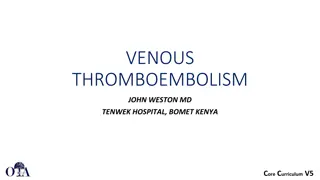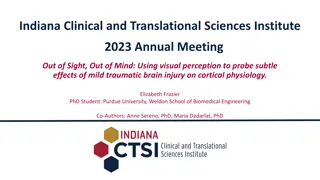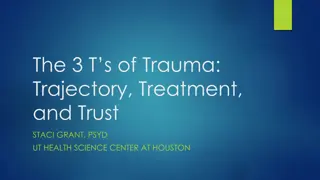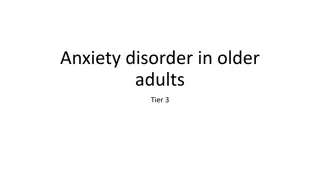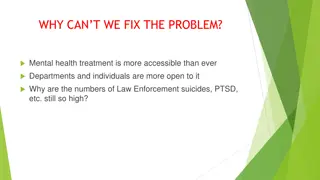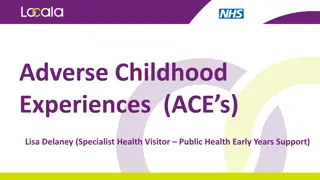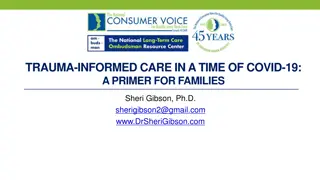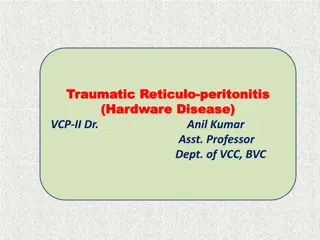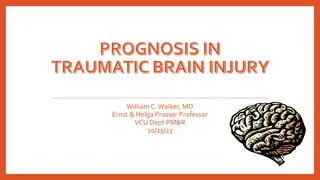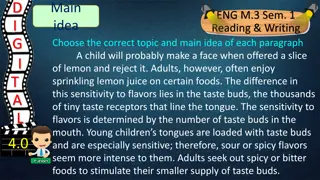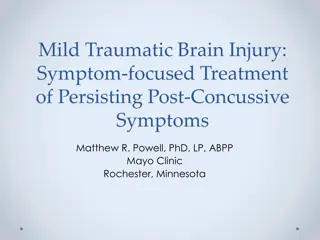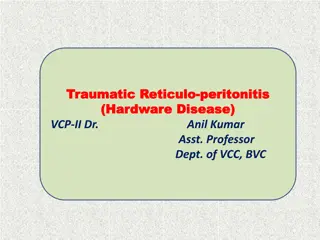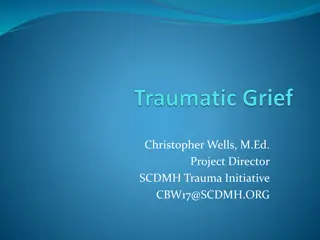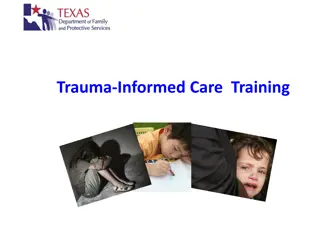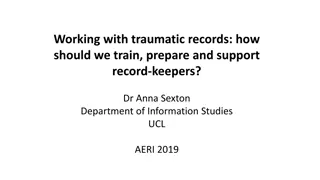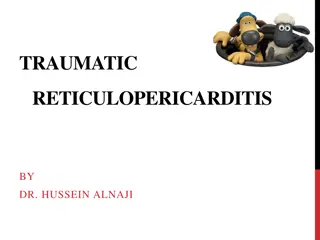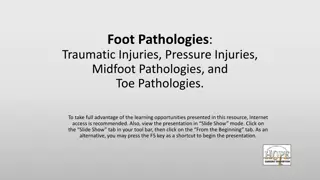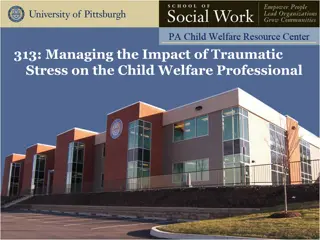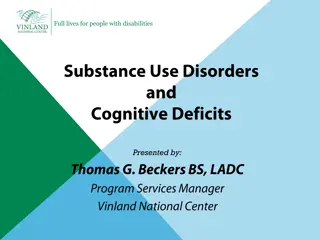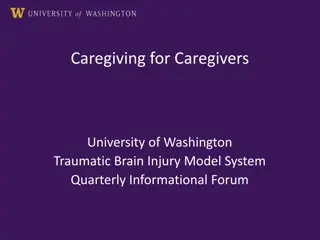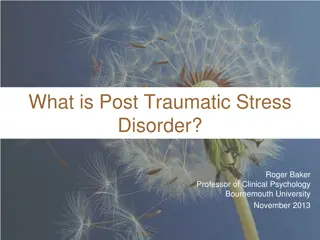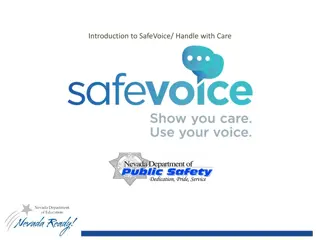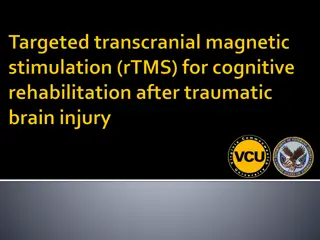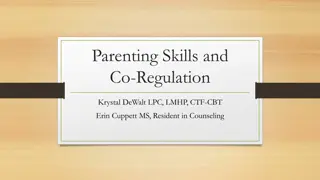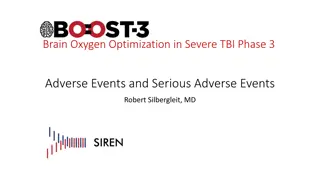Equity-Centered Trauma-Informed Education Overview
Explore the fundamentals of Equity-Centered Trauma-Informed Education (ECTIE) including the definition of trauma, examples of potentially traumatic events, and strategies for creating awareness, taking action, and advocating for equity. Learn how to implement trauma-informed practices, address syste
2 views • 49 slides
Understanding Venous Thromboembolism in Orthopedic Patients
This educational content covers the basics of deep vein thrombosis (DVT) and pulmonary embolism (PE), including definitions, pathophysiology, risk factors, prevention strategies, diagnosis, and treatment. Traumatic and non-traumatic risk factors for VTE in orthopedic patients are discussed, emphasiz
0 views • 36 slides
Understanding Adverse Events Following Immunization (AEFI)
Adverse Events Following Immunization (AEFI) are medical incidents that occur after immunization, potentially caused by the vaccine, leading to unfavorable symptoms. Pharmacovigilance plays a crucial role in detecting, assessing, and preventing these events. AEFI can impact immunization programs at
2 views • 40 slides
Investigating Visual Perception Effects of Mild Traumatic Brain Injury
Elizabeth Frazier, a PhD student at Purdue University, explores the subtle effects of mild traumatic brain injury (mTBI) on cortical physiology using a novel two-alternative forced choice task in mice. The study aims to bridge visual deficits and cortical circuitry changes post-mTBI to improve diagn
0 views • 5 slides
Understanding the 3 Ts of Trauma: Trajectory, Treatment, and Trust
This comprehensive guide delves into the critical aspects of trauma - Trajectory, Treatment, and Trust. It covers the definition of trauma, PTSD symptoms, potentially traumatic events, trajectories of traumatic stress, and the impact of trauma on mental health. Explore the effects on behavior, biolo
0 views • 29 slides
Understanding Probability in Events
Explore concepts of probability in various events like rolling a die, compound events, simple events, and spinner probability. Learn how to calculate probabilities of different outcomes and understand the difference between single and compound events. Discover key principles in probability theory an
0 views • 13 slides
Understanding Anxiety Disorders in Older Adults
Anxiety disorders in older adults are prevalent but often unrecognized. These disorders can manifest alongside depression, impacting daily life. Risk factors include gender, education, health status, traumatic events, and more. Types of anxiety disorders include generalized anxiety, phobias, panic d
0 views • 17 slides
Challenges in Addressing Mental Health in Law Enforcement
Despite increased accessibility to mental health treatment, the numbers of law enforcement suicides and PTSD remain high. Current psychological/behavioral programs focus on prevention rather than providing tools for survivors. Critical incident stress management plays a crucial role in supporting em
0 views • 24 slides
Impact of Adverse Childhood Experiences (ACEs) on Individuals and Society
Adverse Childhood Experiences (ACEs) encompass a wide range of traumatic events during childhood that can have long-lasting effects on individuals. These experiences, such as abuse, neglect, and family issues, can significantly increase the risk of developing harmful behaviors and health conditions
1 views • 15 slides
Understanding Urological Emergencies: Causes, Symptoms & Treatment
Discover the different types of urological emergencies, both traumatic and non-traumatic, including hematuria, renal colic, urinary retention, acute scrotum, and more. Learn about the causes, symptoms, and immediate treatments required for these urgent urological conditions. Find out how to identify
3 views • 67 slides
Understanding Trauma-Informed Care During COVID-19
This primer by Dr. Sheri Gibson explores trauma-informed care in the context of COVID-19, emphasizing the multifaceted individual responses to trauma. It delves into the elements of trauma-informed care, the prevalence of trauma, and provides insights on recognizing and addressing trauma amidst the
0 views • 39 slides
Understanding Fractures: Traumatic vs. Pathological and Modeling Options
Defining the distinction between traumatic and pathological fractures, exploring the relationship between non-traumatic fractures and underlying bone pathologies, and discussing modeling options for classifying fractures. Stress fractures, insufficiency fractures, and the causes of pathological frac
2 views • 8 slides
Understanding Traumatic Reticuloperitonitis in Cattle
Traumatic reticuloperitonitis, also known as hardware disease, is a serious condition in cattle caused by the ingestion of foreign objects. The perforation of the reticulum wall leads to peritonitis and potential complications affecting various body systems. Recognizing the clinical signs, such as s
0 views • 10 slides
Understanding Prognosis in Traumatic Brain Injury
Prognosis in traumatic brain injury is influenced by various factors such as population characteristics, impairment levels, and time frames. Predicting short-term and long-term outcomes is crucial for effective patient care, financial planning, and resource utilization. Common outcome measures inclu
0 views • 46 slides
Contrasting Reactions to Flavors and Traumatic Events
Children and adults demonstrate varying responses to flavors influenced by the number of taste buds in their mouth, while individuals affected by traumatic events like earthquakes can experience lasting changes in their sense of security, as seen through different behaviors and reactions over time.
0 views • 17 slides
Understanding Mild Traumatic Brain Injury and Treatment Options
Exploring the pathophysiology and clinical recovery of mild traumatic brain injury (mTBI), along with the risk factors for persisting post-concussive symptoms. The importance of diagnosing mTBI and the impact it has on individuals. Highlighting the neurometabolic cascade and functional injuries asso
0 views • 37 slides
Guide to Participating in STAR Events in Georgia FCCLA
Discover the significance of STAR Events in Georgia FCCLA, competitive events acknowledging proficiency in various projects, leadership, and career readiness. Learn how to select individual or team events, choose a suitable project, and initiate your project effectively. Empower yourself to excel in
0 views • 19 slides
Traumatic Reticuloperitonitis (Hardware Disease) in Cattle: Causes and Clinical Signs
Traumatic reticuloperitonitis, also known as Hardware Disease, is a common condition in cattle caused by the ingestion of foreign objects. This article discusses its etiology, pathogenesis, and clinical findings such as sudden onset of rumino-reticular atony and decreased milk production. Perforatio
0 views • 10 slides
Brain Oxygen Optimization in Severe Traumatic Brain Injury (BOOST3) Trials Overview
Overview of the BOOST3 trials focusing on brain oxygen optimization in severe traumatic brain injury patients. The trials involve multiple PIs, training sessions, and hands-on ancillary studies. Various design principles and organizational values are emphasized, with grant awards distributed to diff
0 views • 13 slides
Complex Radiology Case: Multiple Traumatic Injuries in an Elderly Female
A 77-year-old female presented with multiple traumatic injuries after falling headfirst down stairs. Imaging revealed a comminuted inferior orbital wall fracture, facial lacerations, spinal fractures, and cervical cord syndrome. Lab findings indicated preexisting conditions like osteopenia, hyperten
0 views • 18 slides
Understanding Traumatic Grief and Bereavement: A Comprehensive Overview
Explore the complexities of traumatic grief, bereavement, and loss through a detailed examination of definitions, theories, stages, symptoms, impact, and risk factors. Unpack the nuances of acute grief, integrated grief, and the coping mechanisms individuals utilize when faced with profound loss. Ga
1 views • 117 slides
Understanding Trauma-Informed Care Training
Trauma-Informed Care Training involves understanding child traumatic stress, recognizing the effects of trauma on child development, behaviors, and functioning, as well as preventing and coping with Compassion Fatigue. It emphasizes creating safety for both providers and survivors and empowering sur
0 views • 55 slides
Supporting Record-Keepers Dealing with Traumatic Records
Understanding the impact of traumatic experiences on record-keepers is crucial in training, preparing, and supporting them. Trauma, whether singular, ongoing, or complex, can be represented in records stored in archives. The potentiality of records to carry traumatic experiences requires a thoughtfu
0 views • 15 slides
Traumatic Reticulopericarditis in Livestock: Causes, Symptoms, and Management
Traumatic reticulopericarditis in livestock is caused by penetration of the pericardial sac by a migrating metal foreign body, leading to pericarditis, toxemia, and congestive heart failure. Clinical signs include depression, anorexia, respiratory distress, and bilateral jugular distension. If chron
0 views • 13 slides
Understanding Foot Pathologies: Traumatic Injuries and Pressure Injuries
Explore common foot pathologies including traumatic injuries like plantar fasciitis, turf toe, and sprains, as well as pressure injuries such as plantar ulcers and heel spurs. Learn about the causes, symptoms, and treatment options for these conditions.
0 views • 33 slides
Managing Traumatic Stress in Child Welfare Professionals
Learn to identify, recognize, and manage traumatic stress as an occupational hazard in the child welfare profession. This program helps professionals assess the impact of traumatic stress and personal strengths, develop strategies to promote resiliency, and understand the importance of safety and cu
0 views • 30 slides
RMS PTO Board Meeting Update and Event Schedule
The recent RMS PTO board meeting covered various topics such as budget tracking, upcoming events, and recent activities. Discussions included PayPal usage, budget allocations for future fundraisers, expenses, and a review of recent events. The meeting also outlined an array of events planned for the
0 views • 7 slides
Full Lives for People with Disabilities - Addressing Traumatic Brain Injury
Traumatic Brain Injury (TBI) presents a significant public health concern in the United States, often termed as the silent epidemic due to its hidden nature. This condition affects thinking and memory, impacting individuals' lives profoundly. Resources such as "The Essential Brain Injury Guide" shed
0 views • 23 slides
Understanding Probability of Compound Events
Compound events involve multiple outcomes occurring together, such as independent events where one outcome does not affect another, and dependent events where one outcome affects the other. Complement sets, card probabilities, and mutually exclusive events are also discussed, providing a comprehensi
0 views • 15 slides
Understanding Traumatic Reticuloperitonitis in Cattle
Traumatic reticuloperitonitis in cattle is a severe condition caused by the penetration of the reticulum by metallic foreign objects. The ingestion of these objects leads to acute local peritonitis, with symptoms like anorexia, decreased milk yield, and pain during movement. If left untreated, it ca
0 views • 16 slides
Cognitive and Behavioral Management Strategies for Traumatic Brain Injury Patients
This presentation focuses on addressing challenging cognitive, behavioral, and personality issues associated with traumatic brain injury (TBI). It outlines cognitive issues such as attention, speed of processing, learning, memory, and executive functioning. Cognitive management strategies include te
0 views • 18 slides
Understanding Caregiving for Traumatic Brain Injury Survivors
Caregiving for individuals with Traumatic Brain Injury (TBI) is a crucial yet challenging role undertaken by family members or friends. The responsibilities can be overwhelming, impacting both the survivor and the caregiver's well-being. This presentation highlights the needs of caregivers, survivor
0 views • 22 slides
Noise Control Measures and Community Preferences at the Corn Exchange
Various images and references discuss the history of amplified music events at the Corn Exchange, noise complaints leading to control methods by the FTC, impacts on events and community preferences post-control, and survey findings on participant demographics, noise effects, and desired public event
0 views • 19 slides
Understanding Post-Traumatic Stress Disorder (PTSD) and Trauma
Post-Traumatic Stress Disorder (PTSD) is a psychological condition that may develop after a person experiences a traumatic event. Trauma can result from various incidents such as accidents, natural disasters, abuse, or war, leading to personal reactions and challenges in one's perceptions. Victims o
0 views • 104 slides
Introduction to SafeVoice and Handle with Care Program
SafeVoice and Handle with Care program aims to receive tips, especially related to traumatic events involving children, and forward them to law enforcement and schools for necessary actions. The program, initiated through SB-80, emphasizes reporting traumatic events involving children within public
0 views • 9 slides
Cognitive Deficits and Treatment Options Following Traumatic Brain Injury
Traumatic Brain Injury (TBI) can lead to a range of cognitive deficits and long-term complications, affecting communication, sensory perception, behavior, and more. Severe TBI is associated with EEG frequency shifts and cognitive impairments similar to Alzheimer's disease and schizophrenia. While tr
0 views • 34 slides
Supporting Teens After Traumatic Events: Insights and Guidance
Understanding and addressing the impact of trauma on teenagers is crucial in providing effective support. This resource delves into various traumatic experiences such as bullying, abuse, and loss, highlighting the resulting challenges like anxiety and withdrawal. Strategies for supporting teens, inc
0 views • 21 slides
Understanding the Impact of Trauma on Children
Trauma can significantly affect children's emotional, behavioral, and developmental well-being. Research shows that a high number of children experience traumatic events, leading to various challenges. Younger children are particularly vulnerable to the effects of trauma, depending on how their pare
0 views • 45 slides
Brain Oxygen Optimization in Severe TBI: Adverse Events Analysis
This study led by Dr. Robert Silbergleit focuses on adverse events in brain oxygen optimization for severe Traumatic Brain Injury (TBI) patients. It outlines key points for reporting adverse events, discusses relatedness algorithms, and presents scenarios to analyze adverse events occurrence post-en
0 views • 24 slides
Official Kayaking Rules for Michigan Events
Official rules for kayaking events in Michigan including information on events offered, uniforms, equipment requirements, and general rules for athletes. Athletes can enter up to three events but must choose between Traditional or Unified events. The rules cover attire, required equipment such as li
0 views • 14 slides

